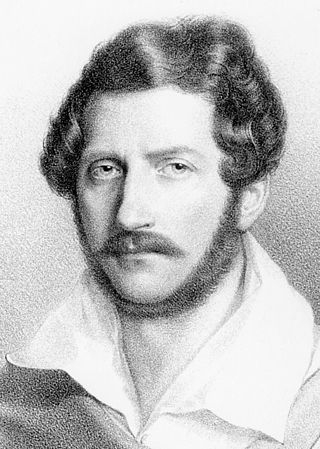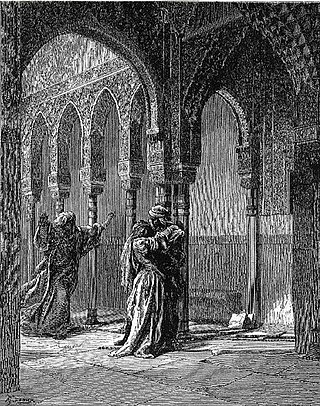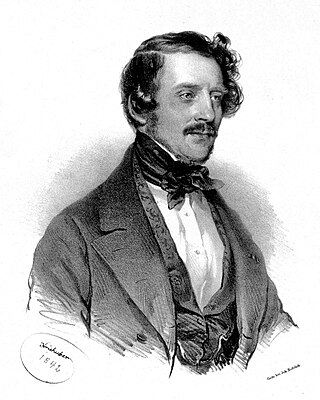
Lucia di Lammermoor is a dramma tragico in three acts by Italian composer Gaetano Donizetti. Salvadore Cammarano wrote the Italian-language libretto loosely based upon Sir Walter Scott's 1819 historical novel The Bride of Lammermoor.

Rosamund Clifford, often called "The Fair Rosamund" or "Rose of the World", was a medieval English noblewoman and mistress of Henry II, King of England. She became famous in English folklore.

Maria Stuarda is a tragic opera, in two acts, by Gaetano Donizetti, to a libretto by Giuseppe Bardari, based on Andrea Maffei's translation of Friedrich Schiller's 1800 play Maria Stuart.

Anna Bolena is a tragic opera in two acts composed by Gaetano Donizetti. Felice Romani wrote the Italian libretto after Ippolito Pindemonte's Enrico VIII ossia Anna Bolena and Alessandro Pepoli's Anna Bolena, both recounting the life of Anne Boleyn, the second wife of England's King Henry VIII.

La favorite is a grand opera in four acts by Gaetano Donizetti to a French-language libretto by Alphonse Royer and Gustave Vaëz, based on the play Le comte de Comminges by Baculard d'Arnaud with additions by Eugène Scribe based on the story of Leonora de Guzman. The opera concerns the romantic struggles of the King of Castile, Alfonso XI, and his mistress, the "favourite" Leonora, against the backdrop of the political wiles of receding Moorish Spain and the life of the Catholic Church. It premiered on 2 December 1840 at the Académie Royale de Musique in Paris.

L'assedio di Calais is an 1836 melodramma lirico, or opera, in three acts by Gaetano Donizetti, his 49th opera. Salvatore Cammarano wrote the Italian libretto, which has been described as "...a remarkable libretto, the closest Cammarano ever got to real poetry, particularly in his description of the embattled city and the heartfelt pride of its citizens". It was based on Luigi Marchionni's play L'assedio di Calais, which had been presented in Naples around 1825, and secondarily on Luigi Henry's ballet L'assedio di Calais, which had been performed in Naples in 1828 and revived in 1835.

Alina, regina di Golconda is an opera in two acts by Gaetano Donizetti. The Italian libretto was written by Felice Romani after Michel-Jean Sedaine's French libretto for Pierre-Alexandre Monsigny's ballet-heroique Aline, reine de Golconde, in its turn based on the novel by Stanislas de Boufflers.

Zoraida di Granata is a melodramma eroico, in two acts by Gaetano Donizetti. The Italian libretto had been partly prepared by Bartolomeo Merelli, based on the French play, Gonzalve de Cordoue ou Grenade Reconquise by Jean-Pierre Claris de Florian (1791), and on a libretto by Luigi Romanelli to an opera by Nicolini called Abenamet e Zoraide.

Maria de Rudenz is a dramma tragico, or tragic opera, in three parts by Gaetano Donizetti. The Italian libretto was written by Salvadore Cammarano, based on "a piece of Gothic horror", La nonne sanglante by Auguste Anicet-Bourgeois and Julien de Mallian, and The Monk by Matthew Gregory Lewis. It premiered at La Fenice in Venice, on 30 January 1838.

Maria Padilla is a melodramma, or opera, in three acts by Gaetano Donizetti. Gaetano Rossi and the composer wrote the Italian libretto after François Ancelot's play. It premiered on 26 December 1841 at La Scala, Milan. The plot is loosely based on the historical figure María de Padilla, the mistress of Pedro the Cruel, King of Castile.

Maria di Rohan is a melodramma tragico, or tragic opera, in three acts by Gaetano Donizetti. The Italian libretto was written by Salvadore Cammarano, after Lockroy and Edmond Badon's Un duel sous le cardinal de Richelieu, which had played in Paris in 1832. The story is based on events of the life of Marie de Rohan.

Deux Hommes et une femme, also known as Rita, is an opéra comique in one act, composed by Gaetano Donizetti to a French libretto by Gustave Vaëz. The opera, a domestic comedy consisting of eight musical numbers connected by spoken dialogue, was completed in 1841. Never performed in Donizetti's lifetime, it premiered posthumously at the Opéra-Comique in Paris on 7 May 1860.

Gabriella di Vergy is an opera seria in two acts by Gaetano Donizetti written in 1826 and revised in 1838, from a libretto by Andrea Leone Tottola, which was based on the tragedy Gabrielle de Vergy (1777) by Dormont De Belloy. Prior to that, the play was itself inspired by two French medieval legends, Le châtelain de Coucy et la dame de Fayel and Le Roman de la chastelaine de Vergy.

Il castello di Kenilworth is a melodramma serio or tragic opera in three acts by Gaetano Donizetti. Andrea Leone Tottola wrote the Italian libretto after Victor Hugo's play Amy Robsart (1828) and Eugène Scribe's play Leicester, both of which following from Sir Walter Scott's novel Kenilworth (1821). Daniel Auber composed another opera on the same subject, Leicester, ou Le chateau de Kenilworth in 1823.

Imelda de' Lambertazzi is a melodramma tragico or tragic opera in two acts by Gaetano Donizetti from a libretto by Andrea Leone Tottola, based on the tragedy Imelda by Gabriele Sperduti. It received its first performance on 5 September 1830 at the Teatro San Carlo, Naples.
Opera Rara is a London-based opera company and recording label which specialises in recording and performing forgotten operatic repertoire from the 19th and early 20th centuries. Founded in 1970 by bel canto enthusiasts Patric Schmid and Don White, Opera Rara's recordings are internationally distributed by Warner Classics. In September 2019, Italian conductor Carlo Rizzi succeeded Sir Mark Elder as artistic director.

Enrico di Borgogna is an opera eroica or "heroic" opera in two acts by Gaetano Donizetti. Bartolomeo Merelli, wrote the Italian libretto based on Der Graf von Burgund by August von Kotzebue.

Nelly Miricioiu is a Romanian-born British operatic soprano singing a large repertoire ranging from bel canto to verismo.

L'Ange de Nisida is an opera semiseria in four acts by Italian composer Gaetano Donizetti, from a French-language libretto by Alphonse Royer and Gustave Vaëz.

Il paria is an opera in two acts by Gaetano Donizetti from a libretto by Domenico Gilardoni, based on Le Paria by Casimir Delavigne and Michele Carafa's Il paria with a libretto by Gaetano Rossi.












